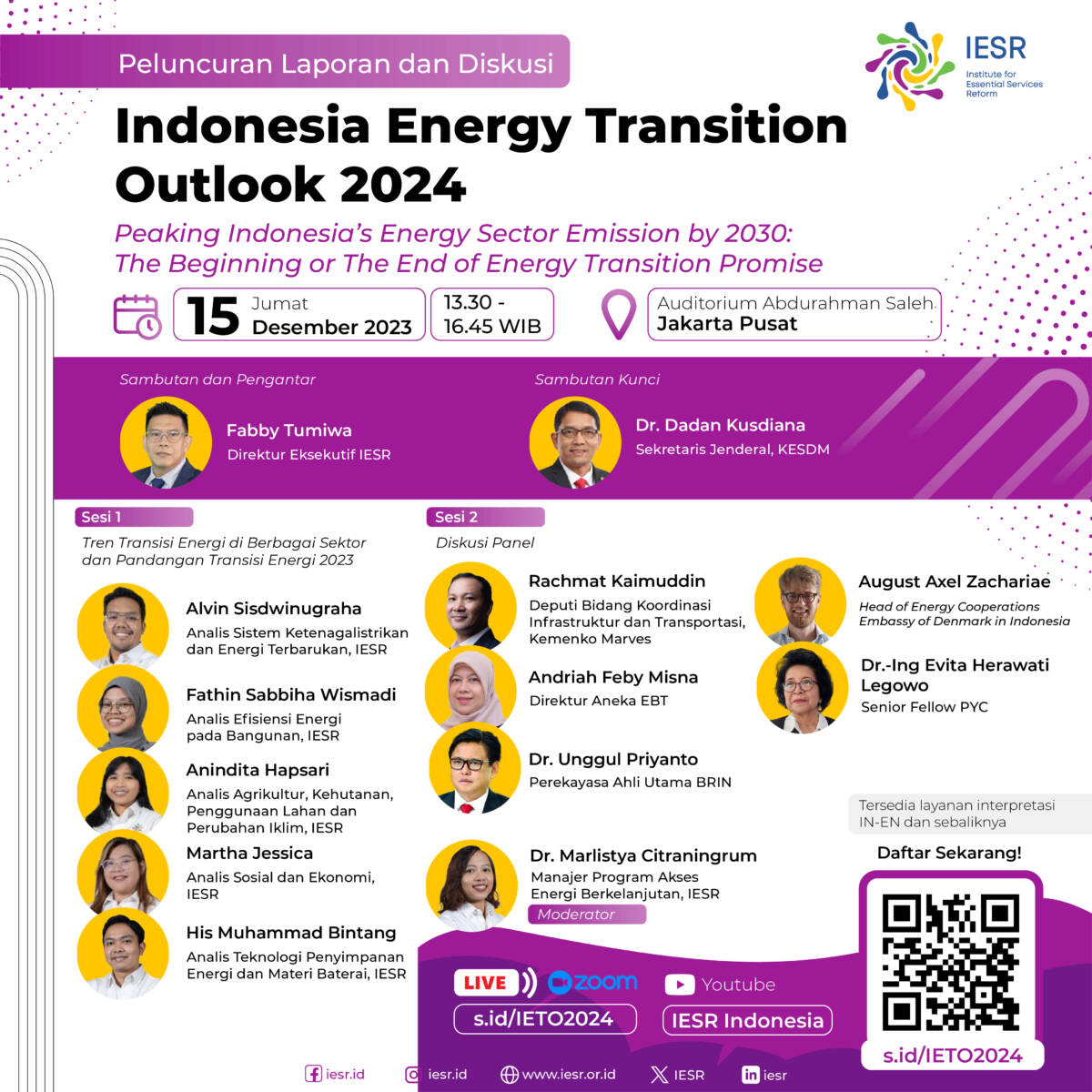
Indonesia Energy Transition Outlook 2024: Tracking Progress of Energy Transition in Indonesia: The Trend and Transformation in Achieving Indonesia Net Zero Ambition
Background
In 2023, through the presidential decree lifting the COVID-19 pandemic situation, it became a stimulus for economic recovery and national development to accelerate. Until the second quarter of 2023, economic growth in Indonesia was recorded at 5.17% (yoy) and showed economic strengthening in several regions in Indonesia. Meanwhile, Indonesia is projected to experience a population increase of 0.9% by 2023. This will certainly boost the level of domestic energy demand. On the other hand, external factors of energy security are caused by conflicts in Russia and Ukraine and the stability of the Middle East region, which will be able to affect the world energy commodity market. Indonesia is also a country that feels the impact.
Indonesia, as a country that has ratified the Paris Agreement through Law No. 16/2016, has emphasized its position to achieve net zero emissions by 2060 or earlier. This commitment is emphasized by increasing the national contribution target, or Enhance-NDC, by 31.89% with its own efforts and 43.20% with international assistance. In line with this, through the Just Energy Transition Partnership (JETP) commitment between the Government of Indonesia and donor countries that are members of the International Partner Group, Indonesia targets to achieve 44% of the renewable energy mix by 2030 and retire 1.7 GW of power plants from the operation of power plants in the network. However, the JETP target is considered less ambitious for efforts to achieve the target of controlling temperature rise by 1.5 oC. This is because it does not include the intervention of captive PLTU, which has a large role in contributing emissions in Indonesia.
Apart from the electricity sector, Indonesia’s energy transition also needs to be encouraged and accelerated in various other energy sectors, such as transportation and industry. On the demand side of national energy needs, the industrial sector is recorded to have a demand of 44.21% in 2022, of which 56.5% is met by coal. This condition is influenced by government policy through the Domestic Market Obligation (DMO) regulation. This policy can support the development of domestic industries that use national natural resources, but on the other hand, the use of coal in the industrial sector also increases greenhouse gas emissions. So it is necessary to control emissions and innovate in energy transformation in the industrial sector. Some large industries that need attention are the cement, iron and steel, and ammonia industries. In the transportation sector, through Ministerial Decree No. 8 of 2023, 38 mitigation action steps have been established that focus on the electrification of land vehicles, including motorcycles, cars, and public vehicles, as well as the use of low-carbon fuels in sea and air transportation.
These developments show that Indonesia’s energy transition is entering the take-off phase. The question is, is the current energy transition process in line with Indonesia’s climate crisis mitigation and sustainable development ambitions? If not, what options can Indonesia focus on to accelerate the energy transition in the near future?
The progress and development of energy transition in Indonesia are specifically reviewed in one of IESR’s flagship reports launched at the end of each year: the Indonesia Energy Transition Outlook (IETO). Published since 2017, the IETO, previously titled Indonesia Clean Energy Outlook (ICEO), aims to regularly monitor the development and progress of Indonesia’s energy transition and identify challenges and opportunities for the following year. The report covers policy analysis and review, technology status updates, and the energy transition ecosystem.
Over the years, IESR has worked to improve the coverage and rigor of its analysis in this report. The sixth edition of the IETO also gathers various perspectives from stakeholders in the energy sector and addresses them with in-depth studies to deliver strategic analysis on the energy transition and transformation to a low-carbon energy system in the country.
Through the IETO, the IESR intends to inform policymakers and all stakeholders in the energy sector on the effectiveness of policies and improvements needed to help accelerate the development and transition of clean energy in the country. By doing so, it is hoped that Indonesia can ensure energy security, a competitive economy, and transition to a sustainable energy system in the near future.
IETO 2024 will be launched in a special meeting to get views and perceptions from policymakers and actors on the upcoming trends in the energy transition. Discussions in this meeting will highlight the energy transition processes taking place in various energy sectors in Indonesia and be followed by an analysis of the energy transition readiness framework in Indonesia’s electricity sector, as well as lessons learned in 2023 to address challenges in driving the energy transition in 2024.
Objective
The Indonesia Energy Transition Outlook (IETO) 2024 launch meeting and discussion was organized with the following objectives:
- Inform and introduce the IESR flagship report, Indonesia Energy Transition Outlook (IETO).
- Review and evaluate the development of the energy transition (fossil energy, renewable energy, and energy efficiency) in Indonesia during 2023 in the context of the impact of government policies and regulations issued to relevant stakeholders, as well as the review in 2024.
- Review the evaluation and transition readiness framework for Indonesia’s electricity sector with policymakers and stakeholders.
- Provide a policy dialogue space for stakeholders, including policymakers and businesses, as well as civil society organizations, in the process of formulating and implementing more sustainable energy transition policies.
Speakers
-
Rachmat Kaimuddin - Deputy Coordinating Ministry for Infrastructure and Regional Development
-
Fabby Tumiwa - Chief Executive Officer (CEO) - IESR
-
His Muhammad Bintang - Energy Storage Technologies and Battery Materials Analyst - IESR
-
Uliyasi Simanjuntak - Communications Manager - IESR
-
Fathin Sabbiha Wismadi - Energy Efficiency in Building Analyst - IESR
-
Alvin Sisdwinugraha - Head of Energy System Modelling and Analyst - IESR

